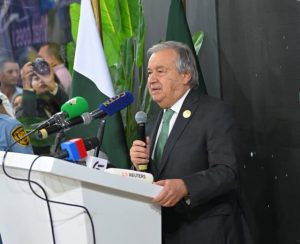UN suggests debt reduction for Pakistan in light of flood recovery
Shehbaz describes COP27 as a crucial chance to advance climate justice.

SHAMAR EL-SHEIKH
Addressing the issue of climate-induced “loss and damage” to the impacted developing countries would be a primary “deliverable” at the COP27 meeting, which began on Monday in Sharm el-Sheikh, according to Prime Minister Shehbaz Sharif.
Nearly 100 heads of state and government gathered at the Red Sea resort for two days of discussions intended to further reduce emissions and aid developing nations financially. The COP27 unanimously decided to add a topic on “loss and damage finance” to the agenda at Pakistan’s request.

During a joint press stake-out and conversations with UN Secretary-General Antonio Guterres, who visited the Pakistan Pavilion during the summit, Shehbaz stated that Pakistan needed significant international assistance for flood relief.
The prime minister stated that the Post Disaster Needs Assessment (PDNA) determined that the recent floods in Pakistan had inflicted approximately $32 billion in overall damages or around 10% of the nation’s gross domestic product (GDP).
In order for Pakistan to rebuild greener and in accordance with the principles of sustainable development, the massive work of rehabilitation and reconstruction will necessitate significant international cooperation, he continued.
Shehbaz emphasized that COP27 provided the world with a crucial chance to “catalyze concerted international action to limit the consequences of climate change and achieve climate justice.”
He praised Guterres for his support of Pakistan during the disastrous floods in that nation and agreed with his demand for climate justice and unity.
The deputy secretary general-led UN interagency team that was established to assist Pakistan in creating a thorough rehabilitation and reconstruction plan that would be submitted before the conference was also acknowledged by the prime minister.
At a joint press conference, Guterres urged the G-20 nations and international financial organizations to aid Pakistan with its post-flood reconstruction and rehabilitation efforts by reducing its debt.
He claimed that although Pakistan was a middle-income nation, it had not received the debt relief or preferential assistance it required to combat the harmful effects of climate change.
The creation of a mechanism for debt relief for middle-income nations, including Pakistan, was the secretary-suggestion general to the G-20 and the international financial institutions.
He emphasized the necessity of developing an institutional finance framework and outlining a clear plan of action to deal with the crisis. He declared that Pakistan would host an international donor meeting.
Shehbaz predicted that the impact of the flooding alone on the GDP would be 2.2%, but that other extreme climate events, such as heatwaves, forest fires, and fast melting glaciers, had already reduced Pakistan’s GDP by 9.1% annually.
The prime minister informed the foreign media that “nearly 9 million of our people are being pushed into a life of extreme poverty, with an additional 1.9 million families being pushed into multidimensional poverty.”
He continued, “Our path to recovery will be slowed down by rising public debt, rising global energy prices, and lack of actual access to Adaptation Funds.” “We have devoted every resource at our disposal to the national aid.”
As for the fight against global warming, Guterres cautioned the world leaders that mankind had to choose between cooperating or committing “collective death.” He said at the meeting that climate change could not be put on the “back burner” and that humanity had to cooperate or perish.
He asked the wealthier, more polluting nations to assist the poorer, nations who were least to blame for the release of heat-trapping gases. He continued, “There is a moral imperative for wealthy polluters to assist poor countries. It is either a Climate Solidarity Pact or a Collective Suicide Pact.”
At the meeting, Pakistan launched a new organization with more than two dozen other nations to establish mutual accountability for a commitment to halt deforestation by 2030. The “Forest and Climate Leaders’ Partnership” was established by more than 25 nations, including Pakistan, Japan, the Republic of Congo, the United Kingdom, and others, and billions of dollars were pledged to fund the initiative.
Over 140 leaders made a commitment to stop deforestation by the end of the decade at COP26 in Britain, and the group’s inaugural meeting, which was presided over by Ghana and the United States, took place a year later. Since then, there has been uneven progress, with just a few nations implementing more rigorous deforestation and finance policies.
The new group plans to meet twice a year to assess progress and represents about 35% of the world’s forests. Alok Sharma, the British representative who presided over last year’s COP meetings, stated, “This cooperation is a key next step to collectively deliver on this commitment and help keep the aim of keeping global warming to 1.5C alive.”
In a statement, Sharma claimed that almost 22% of the $12 billion in public funding committed in Glasgow for forests by 2025 had already been spent. Germany said that it would increase its funding for forests to €2 billion by 2025, which is one of the new sources of funding.
Additionally, private enterprises disclosed an increase of $3.6 billion. At the start of COP27, several initiatives to fulfil the 2030 forest pledge also reported little steps forward. 19% of the $1.7 billion allocated to promoting land rights and forest protection, according to a consortium of 25 governments and nonprofits, had been spent.
The COP27 met as countries around the world were dealing with increasingly severe natural disasters that had cost billions of dollars and claimed thousands of lives just this year alone. These disasters ranged from devastating floods in Pakistan and Nigeria to droughts in the United States and Africa and unheard-of heatwaves across three continents.
The president of Egypt, Abdel Fattah al-Sisi, declared, “We have witnessed one calamity after another.” Wave after wave of misery and loss erupts as soon as we address one calamity, he continued. “Isn’t it time to end this pain once and for all?”
President Emmanuel Macron of France encouraged China, the United States, and other wealthy, non-European countries to “step up” their efforts to reduce emissions and offer financial assistance to other nations. On the eve of the conference, Macron told French and African climate activists, “Europeans are… the only ones paying.”
Ministerial are expected to get involved in the COP27 during Week 2 and the event is expected to go through November 18. Human Rights Watch reported that authorities had detained dozens of individuals and restricted the right to demonstrate in the days preceding COP27, thus security at the meeting was tight.










































